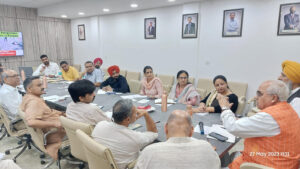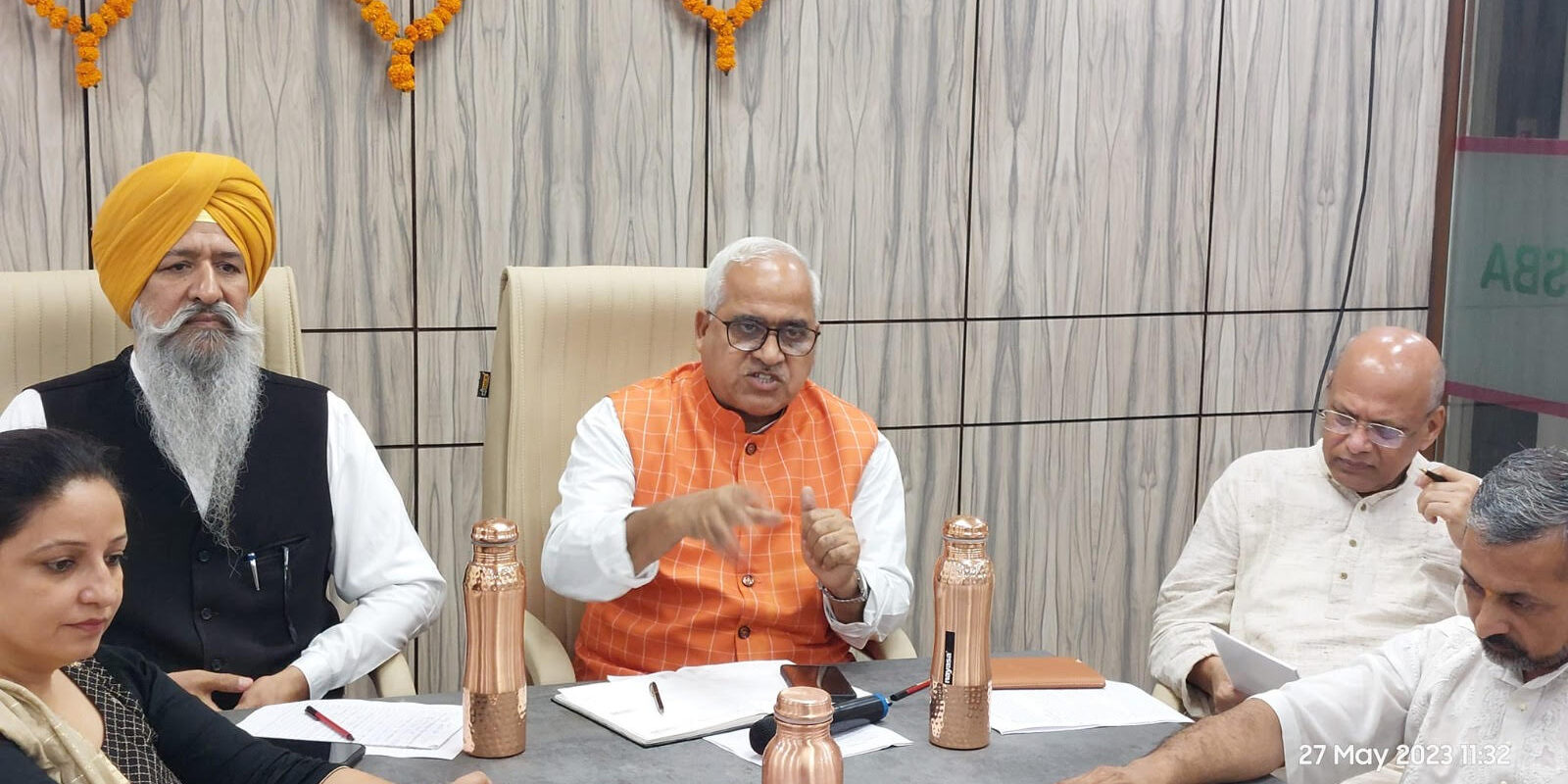New Punjab for New Bharat: Issues and Way Forward
Date: 27th May 2023.
Venue: Rojgar Surjan Kendra, R. K. Puram, New Delhi.
- Welcome of participants:
CA Anil Sharma welcomed all the participants to the meeting. He said “It is my pleasure to welcome Honorable Satish Kumar Ji, Akhil Bhartiya Sah Sangathak, Dr, Ashwani Mahajan, Professor, University of Delhi, Kernail Singh Ji and other participants present in the meeting.
- Introduction to main agendas:
Dr. Sarabjeet Kaur introduced the main agendas of the meeting. She said,” Punjab is one of the most prosperous states of the country drifting downwards economically.” Major issues are degrading economic status, and degrading agricultural and industrial growth. Punjab has been facing political instability and social unrest for many years, and this has led to a lack of confidence in the state’s economy and job market. Many people migrate to other countries in search of a more stable and secure environment. Many people in Punjab strive for normal living standards, including access to better healthcare, education, and infrastructure. Further drug addiction has wrecked many young lives representing all sections and classes of people in the urban and rural areas of Punjab. Another major issue is the increasing Christian conversion rate in Punjab. The Christian organizations are accused of carrying out mass-scale illegal conversions and have significantly affected the demography and culture of the state. One more important issue introduced by Dr. Kaur was radicalism.
- Discussion:
The first speaker Dr. Ashwani Mahajan discussed about degrading economic status of the state. He said that Punjab, India’s one most prosperous state drifted down to rank 19 in terms of per capita GDP, why? India’s economy in Modi Ji’s leadership has jumped from 2 trillion GDP to 3.7 trillion GDP but why is Punjab’s economy degrading? Other states have gone up in GDP like Haryana, Gujarat and Himachal Pradesh. Industry contribution to Punjab’s economy is a matter of concern now. Punjab is number 1 in the race of drug addiction. Freebies provided by the present government increased the state’s debt. Any state debt shouldn’t be more than 20% of GDP but Punjab’s debt has increased more than 50% which is a matter of prime concern.
Dr. Rajender Singh discussed in detail about migration to other countries. He stated, according to Minister of State V. Muraleedharan, that 2.75 lakhs people went abroad from Punjab for study in 2021. A Number of IELTS centers in the state is more than 20K which is much higher as compared to other courses. He mentioned that the main causes of migration are push and pull factors. The main reason for push and pull is unemployment. He said wheat and paddy crops are not sustainable in the state now. Crop should be diversified and industry development will also increase employment.
Dr. Manjeet Bansal discussed agricultural and migration issues in the state in detail. The green revolution in mid-1960s sparked exponential growth in Punjab’s agriculture sector. However, currently agricultural sector is passing through a critical phase where the natural resources are depleting, yields are stagnating, and farm incomes are falling. Groundwater has gone below the desired level. Excess use of pesticides has increased the yield but this food is very harmful to consumers and spreads diseases like Cancer. The only solution to this problem is organic farming. Therefore organic farming should be motivated. The main crops in the state are wheat and rice which consume a lot of water. He stated that one kg of rice needs 5000 litres of water but people don’t want to leave the old tradition of wheat and rice production which gives rise to the problem of groundwater level. He suggested cultivating other crops that use less water. Further, he discussed degrading industrial growth and stated that established industrialists want to move out to neighboring states for safety reasons and the unavailability of raw materials.
In between Dr. Pankaj suggested an agricultural method for the cultivation of some crops where rotation is 15 times per year, temperature-controlled environment and pricing power is 5 times. He said firstly deep research should be conducted on this method and further a video presentation might be circulated to related ministries to focus on the same.
Further, Mr. Gurusewak added that among farmers high power tractors are in new trend these days. Work can be done with low horsepower tractors too which has lower cost. But people are in a race to buy high horsepower tractors which costs around 7 lakhs. This financial overburden ruins everything slowly which leads to suicide for small farmers. He added, “Organic farming is also misleading”.
Honourable Satish Ji addressed increasing yield using the Green Revolution. He said this type of trend should be changed after every 30 to 40 years and new trends in agriculture should be adopted. But unfortunately, it didn’t happen. Green revolution was the need of the hour back then but not now. At present food security is not the prime concern, now we have surplus food from other states. Therefore we should concentrate on the quality of food, not quantity. He said Tilhan and medicinal plants don’t need much water and have pricing power. We are importing tilhan from other countries at very high rates. These kinds of crops should be diversified in Punjab. Further Tilhan export to other countries is friendlier than rice export. Mr. Raj Kumar, Indian Engineering Services, Government of India stated that wheat and rice export is a part of international diplomacy.
Further, Dr. Madhukar added that 1 Kg of rice needs 5000 litres of water called water footprints. Other countries import rice and wheat (which consume huge amounts of water) and cultivate such crops in their own countries which use less water. We should follow the same trend.
 Dr. Pardeep Chauhan said that migration is related not only to the unemployment, it is also related to drugs. Parents think that if the child stays in Punjab he will be drug addicted. So it is better to migrate children to other countries. Therefore migration, drug addiction and unemployment are interrelated. These problems cannot be dealt with separately. He said migration can be made positive from an economic perspective in terms of remittance. Further, Mr. Gurusewak added that unemployment is not the only reason for migration. Even employed people are also migrating in search of better living condition and safe environment. Ms. Preeti discussed the Nai Roshni scheme which aims to empower and enhance confidence among minority women by generating awareness about women’s rights and interventions for ‘Leadership Development’.
Dr. Pardeep Chauhan said that migration is related not only to the unemployment, it is also related to drugs. Parents think that if the child stays in Punjab he will be drug addicted. So it is better to migrate children to other countries. Therefore migration, drug addiction and unemployment are interrelated. These problems cannot be dealt with separately. He said migration can be made positive from an economic perspective in terms of remittance. Further, Mr. Gurusewak added that unemployment is not the only reason for migration. Even employed people are also migrating in search of better living condition and safe environment. Ms. Preeti discussed the Nai Roshni scheme which aims to empower and enhance confidence among minority women by generating awareness about women’s rights and interventions for ‘Leadership Development’.
Further, Dr. Madhur addressed about economics of migration and drug abuse through a video presentation. He presented data related to emigration and drug abuse observed by different surveys across the state.
Christian conversion in Punjab was also discussed. Over 65,000 missionaries in Punjab have converted lakhs of Sikhs in all the 23 Districts of Punjab. Christian missionaries focus mainly on low and middle-class families. They assure them of social, financial stability and free education. The Christian organizations are accused of carrying out mass-scale illegal conversions in Punjab and have significantly affected the demography and culture of the state.
Radicalism was also discussed briefly. It is not only affecting the future of investment in Punjab but also a major impact will be on the existing businesses. Businesses and industries would get influenced to move out from Punjab to other states like Uttar Pradesh, Gujarat, Haryana, or Maharashtra to avoid being victims of the radical movement.
- Vote of thanks:
CA Anil Sharma thanked and acknowledged all the delegates and the support staff who have worked hard to make this meeting a truly successful one. He requested all the delegates and participants to take part in all the activities that will be finalized further.






